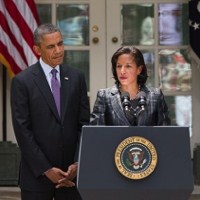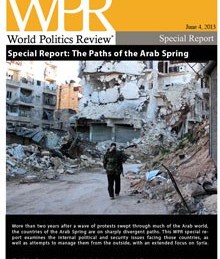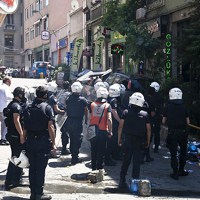The day after the Sept. 11, 2001, attacks on New York City and Washington, I wrote in my notebook, “The big question of the next few years will be whether an 18th-century Constitution is adequate for security in the 21st century. The nation will have a huge debate on this.” As it turned out, I was correct on the first assertion. When drafting the Constitution, America’s Founding Fathers could not have anticipated the intense connectivity of the modern world, where catastrophes of any kind have cascading effects both tangible and psychological. They could not anticipate the existence of small cells […]
Domestic Politics Archive
Free Newsletter

Over the past 12 months, Iran’s June 14 presidential election was shaping up as a struggle among reformers, nationalists and so-called principlists, who pledge allegiance to the supreme leader’s overriding authority. However, with calls for change rising from many Iranians, including the Shiite clergy, fundamentalist ayatollahs stepped in to assist their principlist allies. To “immunize” the “velayat-e faqih”—or “governance of the Muslim jurist,” the principle that gives the ayatollahs final say over the state—against having to reform, Supreme Leader Ayatollah Ali Khamenei and other fundamentalist ayatollahs are seeking massive turnout at the polls and a strong showing in favor of […]

Following World War II, the United States hoped that global security could be managed collaboratively by the victorious allies using a network of international organizations, particularly the newly created United Nations. But it quickly became clear that the Soviet Union would be an adversary, not a partner. Initially, U.S. policymakers disagreed on how to respond to the mounting Soviet threat. Great power strategy was new to Americans, something they had to learn on the fly. Neither placating nor threatening Moscow seemed to work. In 1946, Department of State official George Kennan, an astute student of statecraft and history, offered a […]

U.S. President Barack Obama’s recent speech on America’s use of drones in the conflict with al-Qaida and its affiliates marked his administration’s first real attempt to explain a program that has generated much domestic criticism and international outcry. By contrast, few have taken notice of Brazil’s increasing use of surveillance drones, which it has been dispatching over its vast borderlands in an effort to control illegal immigration, contraband and smuggling. So far, Brazil’s drone initiative has not generated as much political controversy as Obama’s program. Nevertheless, President Dilma Rousseff’s administration must tread lightly lest it offend bordering nations that carefully […]

On Wednesday, President Barack Obama announced that Susan Rice would replace Tom Donilon as national security adviser and nominated Samantha Power to replace Rice as ambassador to the United Nations. The New York Times called the two women “outspoken voices for humanitarian intervention,” noting how they had joined forces with then-Secretary of State Hillary Clinton to persuade Obama to back the NATO-led Libya intervention. But despite their interventionist reputations, Rice and Power will implement the agenda of the president, explained Mark Jacobson, who is senior transatlantic fellow at the German Marshall Fund of the United States and also serves as […]
Back in January, writing in these pages, I wondered whether the appointment of John Kerry as secretary of state and Chuck Hagel as secretary of defense heralded “the third installment of President Barack Obama’s approach to national security,” an Obama Doctrine 3.0 characterized by “retrenchment and rebuilding” rather than intervention. Kerry and Hagel seemed to complement National Security Adviser Tom Donilon’s perspective on foreign affairs; Steve Clemons, back in 2010, had described Donilon as a “realist” and as a “skeptic of many of the military’s grand schemes in which large resources are given [and] big promises made.” Obama’s decision this […]

Three months have passed since Nicolas Maduro took power in Venezuela following the death of Hugo Chavez, and almost 50 days since he became the country’s elected president. However one chooses to date his tenure, there is no denying that, as president, Maduro so far looks anything but commanding in his job. Maduro narrowly managed to survive the election, with barely enough votes to keep the presidency in Chavista hands. Since that razor-thin, rather embarrassing performance, he has battled a constant stream of awkward difficulties, finding plenty to worry about at home and looking for enemies abroad. In the short […]

More than two years after a wave of protests swept through much of the Arab world, the countries of the Arab Spring are on sharply divergent paths. This WPR special report examines the internal political and security issues facing those countries, as well as attempts to manage them from the outside, with an extended focus on Syria. Politics of Reform The Five Models of Arab RevolutionBy Frida GhitisJune 21, 2012 Joining the Fray: Salafi Politics After the Arab SpringBy Will McCantsJanuary 22, 2013 Embassy Attacks in Egypt, Tunisia Could Marginalize ExtremistsBy Nader HabibiSeptember 17, 2012 Suddenly, Hard Times for the […]

A peaceful protest against plans to demolish Gezi Park in Istanbul, Turkey, turned violent last week when riot police responded with tear gas, and the local demonstrations quickly spread to other cities and transformed into a popular movement calling for Prime Minister Recep Tayyip Erdogan to resign. The exponential growth of the demonstrations has been interpreted as resulting from widespread frustration over Erdogan’s failure to respond to public opinion. Henri Barkey, a professor of international relations at Lehigh University, explained in an email interview with Trend Lines that the protests represent a major blow to Erdogan and his standing in […]
